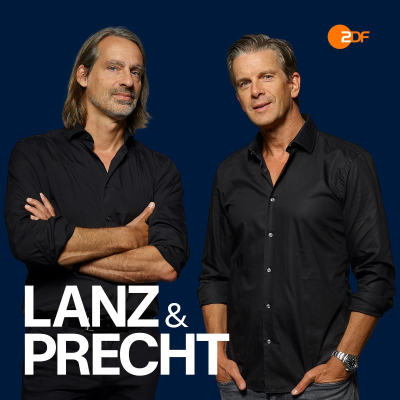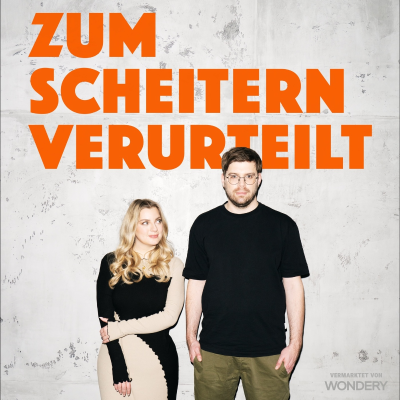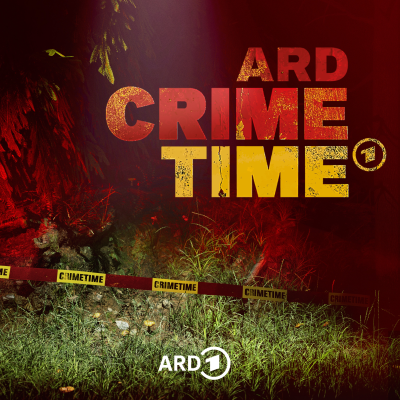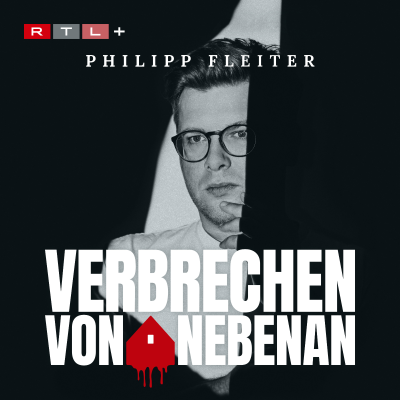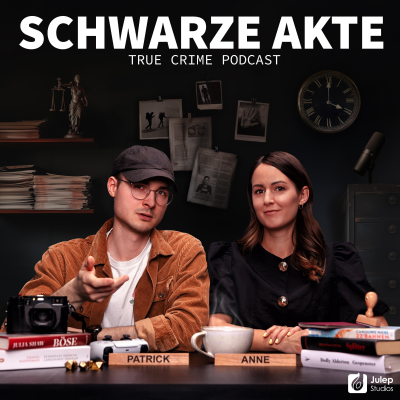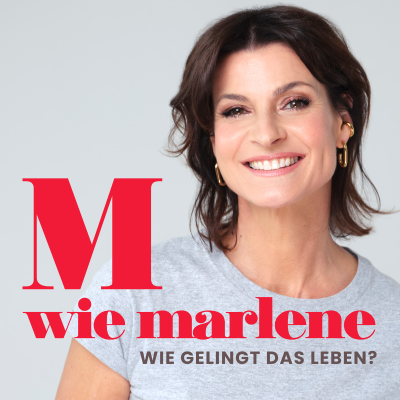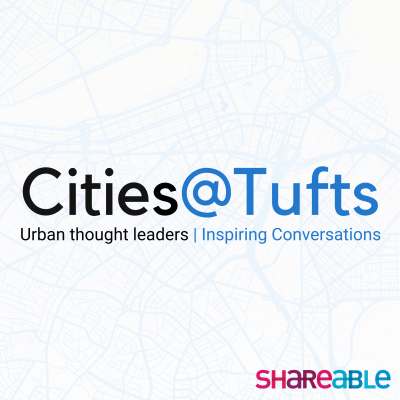
Cities@Tufts Lectures
Podcast von Shareable
Nimm diesen Podcast mit

Mehr als 1 Million Hörer*innen
Du wirst Podimo lieben und damit bist du nicht allein
Mit 4,7 Sternen im App Store bewertet
Alle Folgen
66 FolgenMegan Saltzman presented her new book--Public Everyday Space: Cultural Politics in Neoliberal Barcelona--which explores how everyday practices in public space (sitting, playing, walking, etc.) challenge the increase of top-down control in the global city. Public Everyday Space focuses on post-Olympic Barcelona—a time of unprecedented levels of gentrification, branding, mass tourism, and immigration. Drawing from examples observed in public spaces (streets, plazas, sidewalks, and empty lots), as well as in cultural representation (film, photography, literature), this book exposes the quiet agency of those excluded from urban decision-making but who nonetheless find ways to carve out spatial autonomy for themselves. Absent from the map or postcard, the quicksilver spatial phenomena documented in this book can make us rethink our definitions of culture, politics, inclusion, legality, architecture, urban planning, and public space. About the speaker Megan Saltzman (PhD, University of Michigan) is a teaching professor at Mount Holyoke College in the department of Spanish, Latin American, and Latinx Studies, where she also contributes to the Five Colleges of Massachusetts Architectural Studies Program. Her research focuses on contemporary urban culture of Spanish cities with a transnational and ethnographic approach. Her 2024 book, Public Everyday Space: Cultural Politics in Neoliberal Barcelona [https://link.springer.com/book/10.1007/978-3-031-57796-3] combines literary and visual arts with fieldwork to expose how everyday practices in public space (sitting, playing, street selling) not only challenge the city’s policed image but also serve to carve out autonomy from below. Megan has published on urban cultural themes in Spain related to gentrification, spatial in/exclusion, immigration, nostalgia, recycling, urban furniture design, grassroots cultural centers and “artivism.” Most recently Megan has been teaching courses that revolve around three themes: (1) urban studies, (2) material and non-human culture, and (3) ethnically hybrid identities. Besides teaching at Mount Holyoke, Megan has enjoyed teaching at a variety of colleges, including the University of Otago (New Zealand), Grinnell College, the University of Michigan, Amherst College, West Chester University, and this coming fall at Sophia University in Tokyo. In addition to this audio, you can read the full transcript of the conversation and watch the lecture recording on Shareable.net [https://www.shareable.net/urban-heat-resilience-governing-an-invisible-hazard] – while you’re there get caught up on past lectures. Cities@Tufts [https://www.citiesattufts.com/] Lectures explores the impact of urban planning on our communities and the opportunities to design for greater equity and justice with professor Julian Agyeman [https://julianagyeman.com/]. Cities@Tufts Lectures is produced by Tufts University and Shareable.net [https://www.shareable.net/] with support from Barr Foundation, [https://www.barrfoundation.org/] Paige Kelly [https://www.shareable.net/author/paige-kelly/] is our co-producer and audio editor. The original portrait of Hessann Farooqi was illustrated by Jess Milner [https://www.jessmilner.com/], and the series is co-produced and hosted by Tom Llewellyn [https://www.shareable.net/author/tom-llewellyn/]. “Light Without Dark” by Cultivate Beats [https://soundcloud.com/cultivatebeats/tracks] is our theme song.
Canada was founded on enslavement and dispossession, most exemplified by its assimilationist ideologies and policies, the displacement, subjugation and oppression of Indigenous and Black peoples and cultures, and the expropriation of Indigenous lands. The colonial theft of land and the accumulation of capital have been foundational to Canada’s wealth. In this presentation, Dr. Ingrid Waldron uses settler colonial theory to examine environmental racism in Canada to highlight the symbolic and material ways in which the geographies of Indigenous and Black peoples have been characterized by erasure, domination, dehumanization, destruction, dispossession, exploitation, and genocide. She offers a historical overview of cases of environmental racism in Canada and outlines how she has been addressing environmental racism over the last 10 years in partnership with Indigenous and Black communities, and their allies. About the speaker Dr. Ingrid Waldron is Professor and HOPE Chair in Peace and Health in the Global Peace and Social Justice Program in the Faculty of Humanities at McMaster University. Her research focuses on environmental and climate justice in Black, Indigenous, and other racialized communities, mental illness and dementia in Black communities, and COVID-19 in Black and South Asian communities. Ingrid is the author of the book There’s Something in the Water: Environmental Racism in Indigenous and Black Communities, which was turned into a 2020 Netflix documentary of the same name and was co-produced by Waldron, actor Elliot Page, and Ian Daniel. She is the founder and Director of the Environmental Noxiousness, Racial Inequities and Community Health Project (The ENRICH Project) and helped develop the federal private members bill a National Strategy Respecting Environmental Racism and Environmental Justice (Bill C-226). Bill C-226 was approved at Senate on June 13, 2024, and given royal assent on June 20, 2024, becoming the first environmental justice law in Canada. Dr. Waldron’s book entitled From the Enlightenment to Black Lives Matter: The Impact of Racial Trauma on Mental Health in Black Communities, was published on November 25, 2024. It traces experiences of racial trauma in Black communities in Canada, the US and the UK from the colonial era to the present. In addition to this audio, you can read the full transcript of the conversation and watch the lecture recording on Shareable.net [https://www.shareable.net/urban-heat-resilience-governing-an-invisible-hazard] – while you’re there get caught up on past lectures. Cities@Tufts [https://www.citiesattufts.com/] Lectures explores the impact of urban planning on our communities and the opportunities to design for greater equity and justice with professor Julian Agyeman [https://julianagyeman.com/]. Cities@Tufts Lectures is produced by Tufts University and Shareable.net [https://www.shareable.net/] with support from Barr Foundation, [https://www.barrfoundation.org/] Paige Kelly [https://www.shareable.net/author/paige-kelly/] is our co-producer and audio editor. The original portrait of Hessann Farooqi was illustrated by Jess Milner [https://www.jessmilner.com/], and the series is co-produced and hosted by Tom Llewellyn [https://www.shareable.net/author/tom-llewellyn/]. “Light Without Dark” by Cultivate Beats [https://soundcloud.com/cultivatebeats/tracks] is our theme song.
This talk explores how and why city governments can step up to lead on climate action and how resident organizing is critical in making this happen. This talk also explores how to build and sustain the political coalition to ensure climate justice policies can be passed and implemented. Hessann Farooqi is the Executive Director of the Boston Climate Action Network. He is the youngest person and the first person of color appointed to lead BCAN. Hessann studied economics at Boston University, worked in the United States Senate under Sen. Ed Markey, and served on various federal, state, and local political campaigns. Boston Mayor Michelle Wu also appointed him to oversee the implementation of Boston’s key climate law on the Building Emissions Reduction and Disclosure Ordinance (BERDO) Review Board. Hessann is Co-Coordinator of the Boston Green New Deal Coalition and serves as an Environmental Justice Advisor to the Metropolitan Area Planning Council on developing their Greater Boston Climate Action Plan. Hessann previously served as an advisor to The White House and Department of Energy’s Opportunity Project. In addition to this audio, you can read the full transcript of the conversation and watch the lecture recording on Shareable.net [https://www.shareable.net/urban-heat-resilience-governing-an-invisible-hazard] – while you’re there get caught up on past lectures. Cities@Tufts [https://www.citiesattufts.com/] Lectures explores the impact of urban planning on our communities and the opportunities to design for greater equity and justice with professor Julian Agyeman [https://julianagyeman.com/]. Cities@Tufts Lectures is produced by Tufts University and Shareable.net [https://www.shareable.net/] with support from Barr Foundation, [https://www.barrfoundation.org/] Paige Kelly [https://www.shareable.net/author/paige-kelly/] is our co-producer and audio editor. The original portrait of Hessann Farooqi was illustrated by Jess Milner [https://www.jessmilner.com/], and the series is co-produced and hosted by Tom Llewellyn [https://www.shareable.net/author/tom-llewellyn/]. “Light Without Dark” by Cultivate Beats [https://soundcloud.com/cultivatebeats/tracks] is our theme song.
Climate policy increasingly relies on techniques to remove CO2 from the environment as a supplement to cutting emissions: counter-balancing residual emissions in ‘net-zero’ and reducing atmospheric concentrations of CO2 to safer levels. In this talk, Duncan will survey how cities are engaging with carbon removal – reviewing the realistic scope of possibilities such as carbon negative building materials, and carbon removal through urban waste management; and suggest ways in which urban carbon removal could be governed to contribute to goals of justice and sustainability. Duncan McLaren is currently a Research Fellow with the Institute for Responsible Carbon Removal at American University. His research examines the politics and implications for justice of novel technologies, particularly using public engagement methods. Prior to his PhD studies, completed in 2017, Duncan worked as an environmental researcher and campaigner, most recently as Chief Executive of Friends of the Earth Scotland from 2003 to 2011. He has advised and consulted for research and financial institutions, government departments, philanthropic donors and non-governmental bodies on energy, climate, urban and sustainable development issues. Duncan can be found on Bluesky @duncanmclaren.bsky.social, and at www.duncanmclaren.net [https://www.duncanmclaren.net]. In addition to this audio, you can read the full transcript of the conversation and watch the lecture recording on Shareable.net [https://www.shareable.net/urban-heat-resilience-governing-an-invisible-hazard] – while you’re there get caught up on past lectures. Cities@Tufts [https://www.citiesattufts.com/] Lectures explores the impact of urban planning on our communities and the opportunities to design for greater equity and justice with professor Julian Agyeman [https://julianagyeman.com/]. Cities@Tufts Lectures is produced by Tufts University and Shareable.net [https://www.shareable.net/] with support from Barr Foundation, [https://www.barrfoundation.org/] Paige Kelly [https://www.shareable.net/author/paige-kelly/] is our co-producer and audio editor. The original portrait of Duncan McLaren was illustrated by Jess Milner [https://www.jessmilner.com/], and the series is co-produced and hosted by Tom Llewellyn [https://www.shareable.net/author/tom-llewellyn/]. “Light Without Dark” by Cultivate Beats [https://soundcloud.com/cultivatebeats/tracks] is our theme song.
Contemporary urban discourse is caught in a binary between the Gentrified City, and the Disinvested City. Maliha Safri’s new book presents an alternative urban imaginary: the Solidarity City. Her new co-authored book Solidarity Cities. Confronting Racial Capitalism, Mapping Transformation introduces an alternative spatial imaginary highlighting solidarity relations as definitional features of urban life. In contrast to profit-motive and competition, solidarity economies and the corresponding international movement have commitments to cooperation, democracy, and inclusion. The movement is exceptionally diverse, bringing together community gardens, worker cooperatives, credit unions, all kinds of consumer cooperatives, mutual aid societies, and other organizations. The book makes visible through mapping solidarity economies in three cities - New York City, Philadelphia, and Worcester, MA and analyzes its impact on urban space through spatial analysis, qualitative research, interviews, and economic impact modeling. About the speaker Maliha Safri is Professor of economics at Drew University. Her academic research has focused on collective economic practices (including worker, food, and housing cooperatives, amidst other organizations). By teaching popular education seminars and courses with activists since 2000, and specifically with migrant workers at a variety of worker centers in the process of forming collectives, her research was based in concrete issues faced by participants of what some movement activists call solidarity economies, which are economies prioritizing cooperation and inclusion. She has published articles in Signs, Antipode, Environmental Policy and Governance, the Economist's Voice, Organization, among other journals and edited book collections. She has a new co-authored book Solidarity Cities: Confronting Racial Capitalism and Mapping Transformation (January 2025, University of Minnesota Press). Resources * Solidarity Cities Confronting Racial Capitalism, Mapping Transformation [https://www.upress.umn.edu/9781517916022/solidarity-cities/] by Maliha Safri, Marianna Pavlovskaya, Stephen Healy and Craig Borowiak In addition to this audio, you can read the full transcript of the conversation and watch the lecture recording on Shareable.net [https://www.shareable.net/urban-heat-resilience-governing-an-invisible-hazard] – while you’re there get caught up on past lectures. Cities@Tufts [https://www.citiesattufts.com/] Lectures explores the impact of urban planning on our communities and the opportunities to design for greater equity and justice with professor Julian Agyeman [https://julianagyeman.com/]. Cities@Tufts Lectures is produced by Tufts University and Shareable.net [https://www.shareable.net/] with support from Barr Foundation, [https://www.barrfoundation.org/] Paige Kelly [https://www.shareable.net/author/paige-kelly/] is our co-producer and audio editor. The original portrait of Maliha Safri was illustrated by Jess Milner [https://www.jessmilner.com/], and the series is co-produced and hosted by Tom Llewellyn [https://www.shareable.net/author/tom-llewellyn/]. “Light Without Dark” by Cultivate Beats [https://soundcloud.com/cultivatebeats/tracks] is our theme song.







